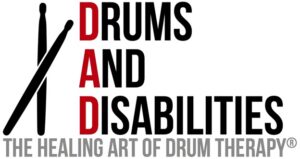
Healing Art of Drum Therapy
DRUM THERAPY OVERVIEW
Drum Therapy® combines the principals of physical and cognitive functioning, and the art of drumming. Drum Therapy® techniques are used as an intervention to provide the special needs community with the opportunity to participate in creative, verbal, and non-verbal expression. Psychologists, School Systems, Occupational Therapists, Physical Therapists, Behavioral Therapists, and Teachers throughout the world are licensed Drum Therapy® providers, which can be conducted in either individual or group settings. To become a Drum Therapist, one must become certified in the modalities of Drum Therapy,® which is offered only through the D.A.D. Program.
Drum Therapy® techniques help children and adults with both physical, cognitive, and behavioral disabilities. These techniques are a valuable diagnostic tool in expanding physical, mental, emotional, social, and cognitive development. They combine visual, rhythmic, auditory, and verbal approaches to help mainstream and special needs participants meet the goals and objectives for improvement in fine motor skill, and physical and cognitive functioning. Participants grow both cognitively and emotionally, and gain self-esteem through the creative process of Drum Therapy.®
Drum Therapy® helps participants to learn problem-solving strategies, improve patience and perseverance, helps to develop coordination and retention, and nurtures social skills, sensitivity, cooperation, and conflict resolution. Drum Therapy® is beneficial to all participants. The population targeted for these services are those special needs children and adults whose disability has effected, impacted, or reduced their physical and/or cognitive capabilities. It’s nonthreatening, fun nature, makes it appealing to all age groups. Participant’s music abilities and works are not graded, and program modalities are specifically tailored to meet the specific needs of all participants.
Every participant can and does, grow from Drum Therapy® intervention. Participants in Drum Therapy® sessions might have experienced failure in their previous school classes and/or social settings, whether primarily because of behavioral problems, or a combination of their specific disability with a behavioral problem. As a result, these participants need to experience success, and will find success with Drum Therapy.® As physical and cognitive abilities grow, participants are anxious to return to Drum Therapy® sessions, and a trusting relationship is built between each participant and the Drum Therapist. This trusting relationship opens the door to communication, which becomes the foundation that allows for behavior modification and emotional healing to begin.
Drum Therapy® techniques help all participants to:
Drum Therapy® is beneficial to anyone who is exposed to it. The population targeted for these services are those special needs children and adults whose disability has effected, impacted, or reduced their physical and/or cognitive capabilities. It’s non-threatening, fun nature, makes it appealing to all age groups. Participant’s drumming ability and works are not graded, and program modalities are specifically tailored to meet the specific needs of each participant. The program does not require the student to have specific drumming skills or talent, and can be held in a one on one format, or in a group setting. The program can be held in any setting such as community centers, adult centers, or right in the classroom.
Drum Therapy® is a psycho-educational intervention which gives a participant the opportunity to express themselves in an emotionally safe, non-threatening environment. This process is in itself is highly therapeutic, but unlike participation in school classes or in social activities, participation in a Drum Therapy® session allows a participant to express anger, sorrow, or other related feelings which are “unacceptable” in traditional classes or social settings. Cathartic release of strong feelings such as hyperactivity, anger and fear are encouraged.
After or during a Drum Therapy® session, participants usually discuss their feelings with parents, friends, teachers, and/or counselors. Drum Therapy® classes are held in high esteem, and confidentiality is ethically required, and is a part of the process.
Children who take part in Drum Therapy® sessions should be encouraged to talk with their parents and/or counselors about their feelings. When this occurs, the Drum Therapist is usually contacted by the parent and/or counselor to find out how they can all work together to help the child. This positive interaction enables the Drum Therapist to recognize the issue(s) that the child needs to work through. The Drum Therapist will then design specific Drum Therapy® classes which meet a child’s individual emotional needs. As a result, the Drum Therapist becomes a friend, counselor, and trusted confidante of the child, and the Drum Therapy® environment becomes a “safe haven,” where a client can have fun, be relaxed, and be the best they can be.
Although the primary focus of The D.A.D. Program’s Drum Therapy® curriculum is to help the special needs community manage and or alleviate the symptoms of their disabilities, additional academic and aesthetic benefits should also be mentioned. Whenever a special needs child or adult faces a creative challenge, (and especially when they are really invested in the process emotionally), growth occurs. Drum Therapy® helps participants to develop problem solving techniques, and helps them to learn how to deal with errors, how to make the best of an “error,” and to not simply give up. Participants learn that there are many answers to one problem, and that the answer to a creative question may be different from someone else’s. Participants also learn to respect the uniqueness of each person’s creation. These skills are invaluable in almost every other area of learning.
As a participant progresses in Drum Therapy® sessions, they will learn how to integrate numerous skills into other areas of learning and social activities. Drum Therapy® develops the elements and principles of self discipline, skill, and technique, and helps participants to integrate themselves into a standard learning and social setting. As a result, all skills that participants develop through Drum Therapy® sessions will have deep meaning, and those skills will contribute to future success.